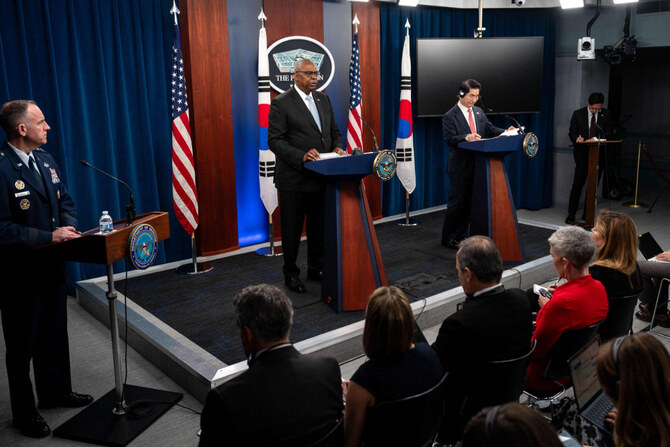WASHINGTON: Defense Secretary Lloyd Austin said Wednesday that North Korean troops wearing Russian uniforms and carrying Russian equipment are moving toward Ukraine, in what he called a dangerous and destabilizing development.
Austin was speaking at a press conference in Washington with South Korean Defense Minister Kim Yong-hyun, as concerns grow about Pyongyang’s deployment of as many as 12,000 troops to Russia.
The US and South Korea say some of the North Korean troops are heading to Russia’s Kursk region on the border with Ukraine, where the Kremlin’s forces have struggled to push back a Ukrainian incursion.
Some North Korean advance units have already arrived in the Kursk region, and Austin said “the likelihood is pretty high” that Russia will use the troops in combat.
North Korea’s move to tighten its relationship with Russia has triggered alarms across the globe, as leaders worry about how it may expand the war in Ukraine and what Russian military aid will be delivered to Pyongyang in exchange.
Ukraine’s UN Ambassador Sergiy Kyslytsya, speaking at an emergency meeting of the UN Security Council on Wednesday, said they expect as many as 4,500 North Korean troops to be at the border this week and to begin directly participating in combat operations against Ukrainian forces in November.
Austin said officials are discussing what to do about the deployment, which he said has the potential to broaden or lengthen the conflict in Ukraine. Asked if it could prompt other nations to get more directly involved in the conflict, he acknowledged that it could “encourage others to take action” but provided no details.
“This is something that we’re going to continue to watch, and we’re going to continue to work with our allies and partners to discourage Russia from employing these troops in combat,” Austin said.
Kim said he doesn’t necessarily believe the deployment will trigger war on the Korean Peninsula but could increase security threats.
There is a “high possibility” that Pyongyang would ask for higher technologies in exchange for its troops, such as receiving tactical nuclear and ballistic missile capabilities, he said through an interpreter.
Both Kim and Austin called on North Korea to withdraw its troops.
Russia has had to shift some resources to the Kursk border region to respond to Ukraine’s offensive. US leaders have suggested that the use of North Korean forces to augment Russia’s defenses indicates that Moscow’s losses during the more than two-year war have significantly degraded its military strength.
“They’re doing this because (Russian President Vladimir) Putin has lost a lot of troops,” Austin said, adding that Moscow has a choice between mobilizing more of its own forces or turning to others for help.
Already, he noted, Russia has sought military weapons from other nations. Those include North Korea and Iran.
The US has estimated there are about 10,000 North Korean troops now in Russia. But others have put the number higher. And Kyslytsya provided an array of more specific numbers and details to the UN Security Council.
The Ukrainian ambassador said up to 12,000 North Koreans were being trained at five bases in eastern Russia, including at least 500 officers and three generals from the General Staff.
In addition to wearing Russian uniforms and carrying Russian small arms, Kyslytsya said they will be provided with Russian identity documents, “notably to conceal their presence.” He said they are expected to be integrated into units manned by Russia’s ethnic Asian minorities, including Buryats.
North Korea’s UN Ambassador Kim Song defended his country’s growing military cooperation with Russia and said Pyongyang stood ready to respond if Russia’s “sovereignty and security interests” were threatened.
Earlier, a senior South Korean presidential official, who spoke on condition of anonymity during a background briefing, said that more than 3,000 of the North Korean forces are believed to have moved toward combat zones in western Russia.
A Ukrainian official told The Associated Press that North Korean troops are stationed 50 kilometers (30 miles) away from the Ukrainian border with Russia. The official, was not authorized to disclose the information publicly and spoke on condition of anonymity, did not provide any additional detail.
North Korea also has provided munitions to Russia, and earlier this month, the White House released images it said were of North Korea shipping 1,000 containers of military equipment there by rail.
A key worrisome question is what North Korea will get in return for providing the troops. But officials have yet to say specifically what Pyongyang may have requested or Moscow has offered.
In their meeting at the Pentagon, Kim and Austin agreed to continue large-scale military exercises, increase cooperation on nuclear deterrence and upgrade their abilities to deter and respond to North Korean missile launches by improving early launch warning systems, according to a fact sheet released by the Pentagon on Wednesday.
Austin and Kim are scheduled to meet Thursday with Secretary of State Antony Blinken and South Korean Foreign Minister Cho Tae-yul at the State Department.





























